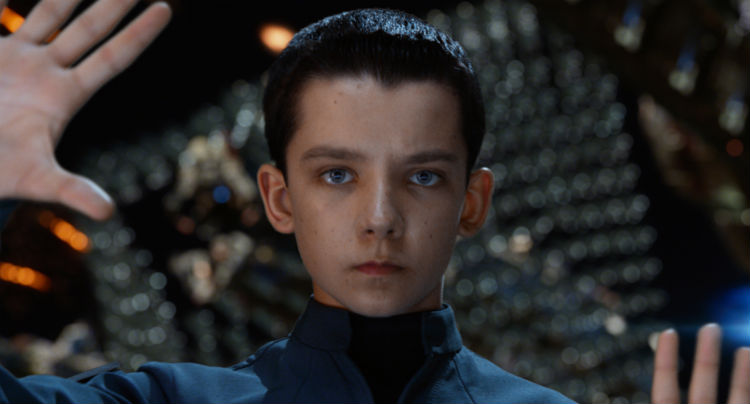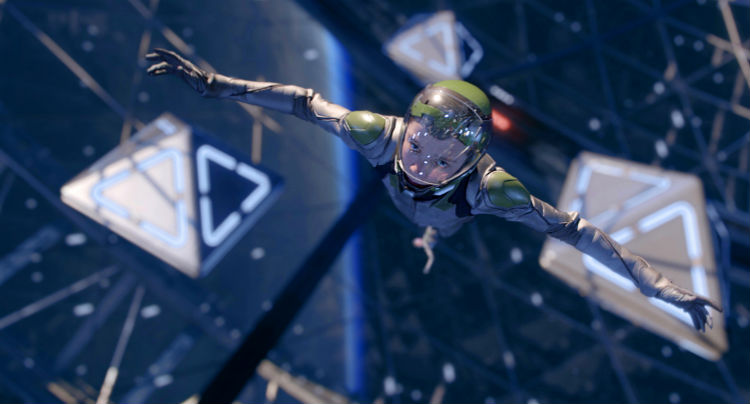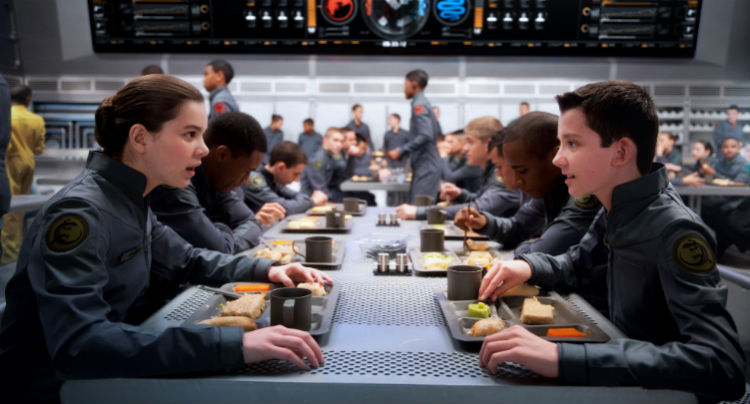
The half-baked high-concept ideas are a tease, but this won't bother those who just came to see a light show.

The half-baked high-concept ideas are a tease, but this won't bother those who just came to see a light show.
Ender’s Game is Gavin Hood’s (X-Men Origins: Wolverine) adaptation of Orson Scott Card’s popular 1985 sci-fi novel about a gigantic, intergalactic war, the outcome of which relies on our eponymous hero, a pre-teen boy-genius. Hood’s film retains the thoughtfulness (however morally misguided) of the source material, homing in on the internal conflicts of the hero rather than relishing in the spectacle of war (though we’re given a satisfactory helping of that.) Hood’s is a heavy-handed thoughtfulness, though, as his symbolism lacks subtlety and finesse. Alfonso Cuaron’s Gravity is this year’s thinking-man’s sci-fi epic; Ender’s Game is best suited for the thinking-boy.
The people of Earth are gathering their forces in preparation for the imminent invasion of an insectoid race of aliens called “Formics”, who fifty years prior had attempted to overtake the planet, killing millions in the process. Humanity endured, barely, all due to the heroic actions of one man: Mazer Rackham (Ben Kingsley, trying on an awful New Zealand accent.) With the enemy’s return looming, earth is in need of a new hero to command its armies, and it must be a child (apparently, only young minds are capable of commanding the impossibly complex fleets of high-tech spaceships.)
Enter Ender Wiggin (Asa Butterfield, Hugo), a 12-year-old with a vast intellect and a prodigious gift for tactical dominance. He’s a “Third”, the youngest of three siblings, in a time when parents are only allowed two children, maximum (a clear reference to China’s “one-child policy”.) Kids at school bully him for this, but his intellectual superiority allows him to defend himself with ease. He’s recruited by grisly military commander Colonel Graff (Harrison Ford, who’s less growl-y than usual, surprisingly) to attend Battle School, a military academy meant to groom the next Rackham that rejected both his violently demented brother, Peter (Jimmy Pinchak), and his warm-hearted sister, Valentine (Abigail Breslin, Little Miss Sunshine herself), who he loves to no end.

We spend most of our time in the futuristic chambers and barracks of the Battle School, which are about as generic as it gets, aesthetically (lots of metal panels, neon lights, inexplicable buttons scattered about randomly). Ender begins, like a lot of us did, as a social outcast in the school halls, but strategically-timed exhibitions of talent (in a quidditch-like laser tag anti-gravity game) and fearlessness (he gives Graff lip, right in front of the others, of course) win his classmates over, inch by inch, making allies out of bullies and adorers out of acquaintances.
Ender’s social maneuverings and foresightful power plays make for the best scenes in the film, and it would have been nice to have seen this interplay receive more attention and time. His classmates Petra (Hailee Steinfeld, True Grit), a sharpshooter quasi love interest, and Bean (Aramis Knight), a pint-sized sidekick, are likable confidants, while his nemesis, Bonzo (Moises Arias), the Napoleonic leader of the bully-brigade, is a one-dimensional, but fun-to-hate villain.
Butterfield fits the role nicely–he’s a believable wunderkind, and while he’s a good looking kid, he’s also not hunky tween-bait. It’s great to see a normal-looking young man leading big-budget series, especially when you consider the film is being distributed by Summit Entertainment, the same folks behind the Twilight series. He acts with his eyes, casting stares that are at once icy and compassionate, and he shows restraint at all times–this is crucial to the role, as Ender is constantly suppressing a war-within.

Despite Ender’s uncanny ability to win his classmates’ respect, Bonzo’s pubescent ego makes his disdain impossible to budge, and he eventually challenges Ender to a fist fight. Ender dispatches of Bonzo physically, in self defense, and hates himself for it. Must he resort to destroying his enemies, like his sinister older brother, Peter? The internal war of humanity versus merciless dominance rages inside Ender throughout the film; Graff’s intent is to wipe all empathy from Ender’s nature, molding him into a cold-hearted commander that’ll do anything to save the human race, while Valentine and his friends keep the kindness in his heart from being hushed.
Card has been criticized for years for the way his novel covets the intentions of the protagonist while excusing his actions, essentially vindicating the violence. Hood makes no attempt to embellish upon Card’s philosophy (or any other part of his story, for that matter), and in fact magnifies his mixed-up morality, constantly bludgeoning us over the head with Ender’s conflict of heart and mind. There are a lot of high-concept ideas swimming around underneath the surface that should be thought-provoking and relevant to our time (training kids for war with video games is a more interesting notion now than it was in the ’80s, when Card’s novel was first published), but Hood’s too enamored with picking apart Ender’s psyche to flesh them out.
The large-scale, shimmering, spaceship battle scenes that bookend the film are spectacular, and will have kids across the country leaping in the air and pumping their fists with excitement at the sci-fi action gloriousness (I’ll admit, my inner video-game-kid was giddy as can be.) The half-baked high-concept ideas floating around Ender’s Game are a tease, but this won’t bother those who just came to see a light show.